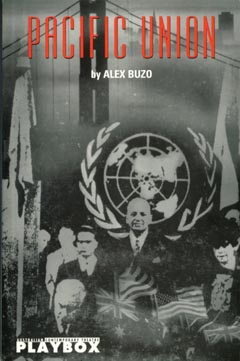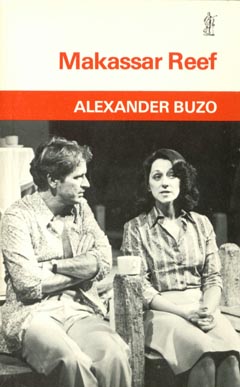
Alexander Buzo
Pacific Union
The Story of the San Francisco Forty-Fivers
Pacific Union is the latest drama by playwright Alex Buzo.
It covers the organizing conference for the founding of the United
Nations held in San Francisco in 1945.
The United Nations Conference on International Organisation opened on
April 25, 1945 at the San Francisco Opera House. Nine weeks later the
delegates had what they came for - a UN Charter - but meanwhile the map
of the world had changed and a whole new kind of warfare was born. The
"Forty-Fivers" came up with a workable document and one that has not
been superseded - yet - but it was a close call for all concerned.
The characters in the play include Carolyn Anspacher, Anthony Eden, Dr
H.V.Evatt, Dean Virginia C. Gildersleeve, Alger Hiss, Clare Boothe Luce,
Jan Masaryk, V.M.Molotov, Carlos P. Romulo, T.V.Soong, Edward R.
Stettinius, Jessie Street and Walter Winchell. Each of them is portrayed
in a realistic and captivating manner, reflecting the true drama of the
conference.
"The play is, quite simply, a delight." Chris Boyd, Herald-Sun
(Melbourne) 22 September 1995

Makassar Reef was first performed in 1979 and features a wide ranging
cast of characters brought together in a rough and tumble port town
in the Indonesian archipelago. The play reveals each character and the
circumstances surrounding their arrival in the port, against the backdrop of
smugglers and political strife.
Two of the characters who recently there arrived from Geneva, no doubt
reflect the first hand experiences of Alex himself. One of them, Camilla,
expresses her frustration at having to leave her friends and school to
follow her mother back to Australia.
In addition to being a playwright, Alex is a frequent contributor to the
Sydney Morning Herald with feature articles on a number of subjects,
including our alumni world reunion. One recent article about a new book
on Mussolini by R.J.B. Bosworth is featured below:
Mussolini
Book Review by Alex Buzo
Sydney Morning Herald - July 20 2002
MUSSOLINI By R.J.B. Bosworth - Arnold Publishers, 599pp, $79.95
The man who was called "Muscle Eenie" on Sydney radio had something in
common with his tormenters. Like Lenin, Trotsky, Mobutu, General Giap
and our own Bob Carr, Benito Mussolini began as a journalist and then
went into politics.
In 1922 he was elected prime minister of Italy, the world's first
fascist leader, after serving as the editor of a socialist newspaper,
Il Popolo d'Italia, and then in the returned services' league. In
1925 he assumed supreme power as Il Duce and announced: "Italy wishes
to be treated by the great nations of the world like a sister and not
like a waitress". Twenty years later, as his corpse hung upside down
in a Milan square, Italy was the whore of Europe.
Richard Bosworth's immensely readable new biography is both popular
history and academically respectable - in other words, the footnotes
are at the back. It is also a painless and focused way of absorbing
the history of a fragmented country.
The personal impact of Mussolini - the big head, the jodhpurs, the
clouds of cologne masking body odour - was immediate, and so was his
political impact. Sympathisers included Marconi, T.S. Eliot and
Archbishop Mannix of Melbourne, as the Duce went about the task of
modernising Italy and acquiring an empire.
Of the three big dictators - Il Duce, Der
Fuhrer, El Caudillo - Mussolini was the least interested in committing
atrocities. An armchair racist, he never introduced concentration
camps or genocide and did not liquidate rivals - because they were
non-existent. There was none of the Third Reich's
anti-intellectualism. South of Rome, malaria and illiteracy were
targeted by the reformist regime and, yes, the trains were said to run
on time - a piece of propaganda, not folklore.
When "the Furies came for the Duce", in Bosworth's memorable phrase,
it was because of the hesitant - but fatal - flirtation with Hitler's
Germany. As a Romanian diplomat noted: "He saw himself being dragged
along the very road he had opened". In a mixture of the personal and
political that characterises Mussolini, Bosworth writes of his
subject in 1939:
"It was to dispel demeaning thoughts of any kind that the Mussolinian
regime now finally invaded and absorbed Albania. It did so in as
thuggish a manner as possible, attacking on Good Friday, the day after
Albanian Queen Geraldine had been delivered of a baby son."
Mussolini had spent the 1930s signing pacts and trying to annexe
Ethiopia, which he finally did in 1935. During this period he was
denounced as a gangster by the British foreign secretary, Anthony
Eden, and was the subject of an unflattering biography called Sawdust
Caesar. Hitler's election as chancellor in 1933 had been hailed by
the press in Rome ("An Italian triumph ... Fascism now a universal
doctrine"), and some sections were confident that Stalin would follow
Mussolini and Hitler from socialism to fascism.
Freudians and others have long pondered the question, "What do
Italians want?" In 1940 what they wanted was to enter a short war and
to have their entry prove decisive. What actually happened could not
have been worse; while Hitler surfed the big moments, Mussolini
dreaded them, nursing his ulcer and making late-night phone calls to
his mistress. He knew Italy was under-prepared for war and that his
flimsy regime would not survive a crisis.
Franco, a pipe-and-slippers fascist, kept Spain out of the war and
survived in power until 1975. Mussolini was not able to resist the
pressure from Hitler and, on June 10, 1940, he entered the war that
was to lower Italian prestige for at least two generations.
Defeat in Greece, Libya and Ethiopia followed quickly and led Goebbels
to proclaim, with Aryan contempt for the Latin, "We have the worst
allies that could possibly be imagined". The worst nightmare Italy
could have imagined - invasion from the south by the Allies and from
the north by the Germans - came in 1943. When Mussolini's corpse was
publicly defiled in Milan it was the end of the line for Italy as even
a second-rank power.
Bosworth has a keen aversion to cliche: we are even spared "the
banality of evil" when Mussolini's reputation is being assessed.
Bosworth sees him as an ambitious intellectual from the provinces who
was wrong on practically every issue. The florid denunciation by
conventional leftist A.J.P. Taylor ("Fascist rule was corrupt,
incompetent, empty; Mussolini himself a vain, blundering boaster
without either ideas or aims") is missing here, but the conclusions
are pretty much the same.
In the final chapter, Bosworth tackles the Brechtian question, "Is the
bitch still in heat?" The limited rise of Le Pen, Haider, Fortuyn and
Berlusconi has taken place in an age of entrenched corporate
globalisation, he argues, and this mitigates against the national
socialism founded by Mussolini. Brecht would not be pleased to hear
that the Right has saved Europe from the Right.
Alex Buzo is a Sydney writer and critic.
Other works by Alex Buzo:
Shellcove Road [drama, performance]
Macquarie : A Play [drama, historical fiction]
Norm and Ahmed [drama]
Coralie Lansdowne Says No : A Play [drama, humour]
Rooted [drama]
Makassar Reef [drama]
Tom [drama]
The Search for Harry Allway [novel, crime]
Martello Towers [drama, humour]
The Front Room Boys : A Play in Twelve Scenes [drama, humour]
The Marginal Farm [drama]
Big River [drama]
Applications for performance or public reading can be made with
the author's agents at: mmconnolly @ ozemail.com.au






